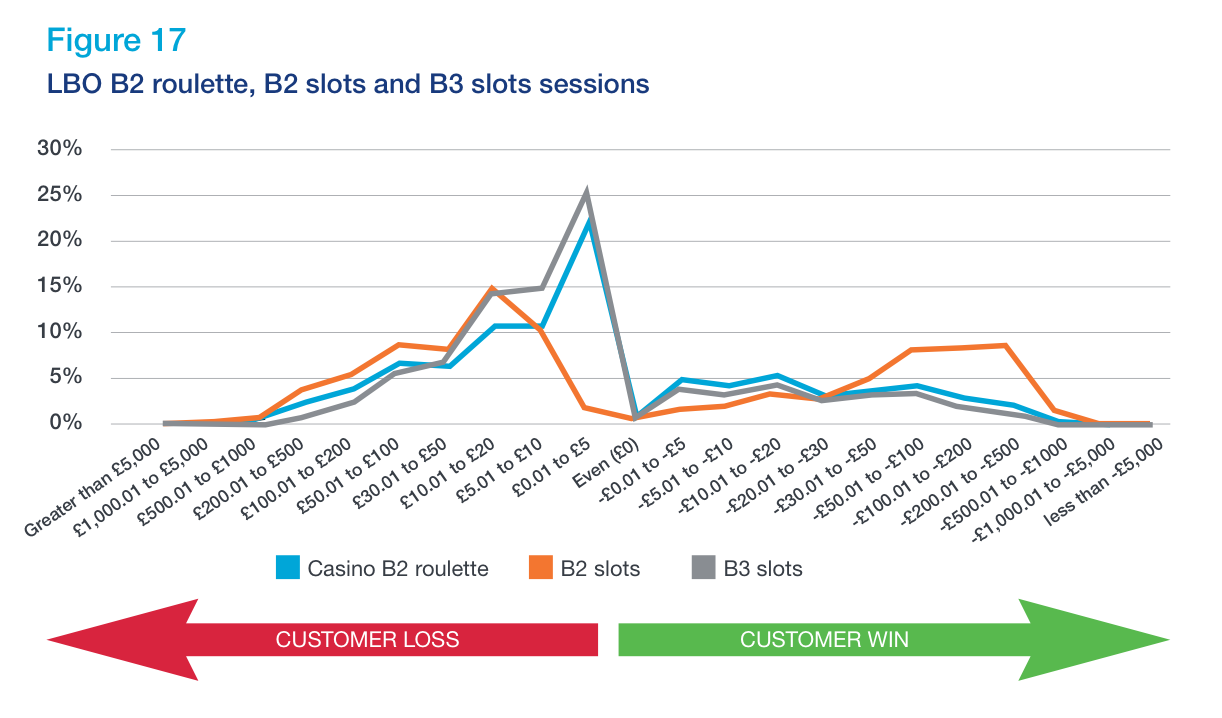Strategy
National Strategic Assessment 2020
This report sets out our latest assessment of the issues we face and the risks that gambling poses to consumers and the public
What are the issues - Gaming machines in premises
Whilst a lot of our focus relates to the shift of consumers toward online gambling and gambling on mobile phones, we remain mindful that playing gaming machines in premises also presents issues and risks.
There are 185,203 gaming machines in Great Britain according to the most recent industry statistics40. Gaming machines are subject to categorisation which determines their maximum stake, prize, speed of play and location41. The Gambling Commission sets the speed of play on gaming machines via technical standards.
The Health Survey for England 2018 records the problem gambling rate for those playing gaming machines in bookmakers at 12.7% and for slot machines at 5.1%, with the moderate risk rate being 14.5% and 9% respectively. This is in addition to low-risk rates of 21.8% for machines in bookmakers and 15.8% for slot machines.
The gaming machine market has had two significant recent interventions. Firstly, the reduction in the maximum stake for B2 gaming machines from £100 to £2 was implemented in April 2019. Subsequently licensed premises providing access to gaming machines were closed due to the coronavirus (COVID-19) outbreak and since reopening have been subject to restrictions. The impacts of these two interventions are still being assessed.
The stake cut to £2 has prompted the withdrawal of B2 gaming machines from the market. It is important that the risks posed by other categories of gaming machines are not overlooked. Remaining category B and C gaming machines share several risk factors considered concerns in relation to category B2 machines and have some additional environmental factors such as the availability of some machines in alcohol licensed premises.

Risks in relation to gaming machines include their location and accessibility, anonymous and untracked play, intensity of play (based on stake, speed of play and return to player) and the effectiveness of oversight and intervention by licensees. Figure 13 illustrates the distribution of session outcomes across different category B2 content and B3 slots prior to the B2 stake cut.
Additional analysis undertaken on category B3 patterns of play since the B2 stake cut has identified a relatively strong correlation between sessions lasting for longer than 60 minutes and sessions ending in a sizeable loss. For example:
- 33% of all sessions losing more than £200 last longer than 60 minutes
- 69% of all sessions losing more than £500 last longer than 60 minutes
- 96% of all sessions losing more than £1,000 last longer than 60 minutes.
This analysis indicates that length of session (i.e. more than 60 minutes) is an important potential proxy for sizeable loss in the absence of real-time spend data.
Where industry has sought to overcome some of the challenges presented by gaming machine play, we have not seen robust evaluation of the impacts on players. For example, evaluation of developments designed to facilitate cashless payment solutions alongside greater player tracking and gambling management tools, or in- session markers of harm have to date been too fragmented.
GC action
We will:
- implement the enhanced test house framework and ensure that the United Kingdom Accreditation Service assessments of Test Houses are robust and effective, providing confidence that gaming machines and online gaming systems meet accreditation standards.
- review what changes are required to our regulatory framework to ensure players of gaming machines are safe, treated fairly and informed about how the machines operate.
Product innovation - Betting Exchanges, Pool betting and Crossover products
Last updated: 25 July 2024
Show updates to this content
Following an audit corrected link formatting issues only.
